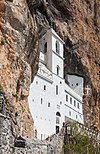Church of St. Elijah, Podujevo
| Church of St. Elijah | |
|---|---|
| Црква Светог Илије Громовника Kisha e Shën Ilias Bubullimës | |
 Church of St. Elijah, Podujevo, after its 2004 destruction by Kosovo Albanians | |
 Church of St. Elijah Location in Kosovo | |
| 42°54′25″N 21°12′11″E / 42.907°N 21.203°ECoordinates: 42°54′25″N 21°12′11″E / 42.907°N 21.203°E | |
| Location | Podujevo |
| Country | Kosovo |
| Denomination | Serbian Orthodox |
| History | |
| Status | Church |
| Founded | 1929 |
| Dedication | Saint Elijah Saint Andrew |
| Architecture | |
| Functional status | Active |
| Completed | 1930 |
| Demolished | 1941-1971, 1999, 2004-2005, 2006 |
| Specifications | |
| Number of domes | 1 |
| Administration | |
| Diocese | Diocese of Raška and Prizren |
The Church of Saint Elijah (Serbian: Црква светог Илије, Crkva svetog Ilije; Albanian: Kisha e Shën Ilias), also known as Saint Andrew's Church, is а Serbian Orthodox church located on a small hill near the city of Podujevo, in Kosovo[a]. The complex includes an Orthodox cemetery. It was built in 1929, and has been demolished several times, as of 2010, the church has been rebuilt and renovated five times.
History[]
1941 destruction[]
The Church was shelled and dome was destroyed in 1941, during World War II.[1] Later, after the creation of Yugoslavia, the church was restored by the Serbian residents of Podujevo.[citation needed] Reconstruction was finally finished in 1971.[1]
1999 attack[]
In 1999, the church was burnt down in what appeared to "be a well-planned action, conducted by criminal elements" after KFOR patrols changed shifts.[2] The barb wire that guarded building was cut and the door was forced open.[2]
2004 destruction[]
In 2003, UNMIK made a request of the Diocese of Raška and Prizren to evacuate movable church inventory, as an attack seemed inevitable.[citation needed] The church was destroyed on 18 March 2004, during 2004 Kosovo Unrest. According to Czech KFOR Captain, Jindrich Plescher, the church was attacked by a mob of 500 Albanians.[3] Czech media confirmed that Czech soldiers had to leave the Church compound that was destroyed along with the cemetery. The Albanians set a large fire in the middle of the church which severely burned it.[3] Plescher stated that the Albanian attackers had dug up coffins from the nearby Serbian cemetery, and scattered the bones of the dead.[3] St. Andrew was shelled, a bell tower completely destroyed with explosives and the wall that surrounded the church was demolished. The , an EU funded project managed by the European Commission Liaison Office implemented by the Council of Europe, in order to promote the Rehabilitation of Cultural Heritage in Kosovo, noted:
Looted and burnt down. Apse blown up with explosives. Floors, internal surfaces and joinery damaged. Roof cover partially removed. Boundary wall demolished.[4]
Bell[]
After the destruction of the church, Czech KFOR soldiers found and confiscated the stolen bell of the St. Elijah Church from an Albanian family.[5] The bell was a gift from Yugoslav King Alexander I Karađorđević to the Podujevo Church in 1932, two years prior to his assassination in Marseilles. The Albanian representatives asked three times for the bell, saying that the bell belonged to the Podujevo municipality.[5] But The Czech KFOR battalion refused, saying that the bell is the property of the Serbian Orthodox Church, and Lieutenant colonel Josef Kopecky with Czech and Slovak soldiers delivered the bell to the Gračanica Monastery.[6] The chaplain of the battalion personally cleaned the bell.[5]
2006 attack[]
This section needs expansion. You can help by . (January 2010) |
On 12 May 2006, the church was attacked once again by Kosovo Albanians.[7] After partial reconstruction, led by the Council of Europe fund, the main doors of the church were breached, and all of the windows on the church were broken again.[8]
See also[]
- Anti-Serb sentiment
- Battle of Podujevo
- Podujevo bus bombing
- Podujevo massacre
Notes[]
| a. | ^ Kosovo is the subject of a territorial dispute between the Republic of Kosovo and the Republic of Serbia. The Republic of Kosovo unilaterally declared independence on 17 February 2008. Serbia continues to claim it as part of its own sovereign territory. The two governments began to normalise relations in 2013, as part of the 2013 Brussels Agreement. Kosovo is currently recognized as an independent state by 97 out of the 193 United Nations member states. In total, 113 UN member states are said to have recognized Kosovo at some point, of which 15 later withdrew their recognition. |
References[]
- ^ Jump up to: a b ЦРКВА СВЕТОГ АНДРЕЈЕ У ПОДУЈЕВУ (PDF) (in Serbian). Serbian Orthodox Church.
- ^ Jump up to: a b Irgens, Ole (10 November 1999). "KFOR Press Update". KFOR Press Updates.
- ^ Jump up to: a b c Munk, Eva (25 March 2004). "Czechs hold line in Kosovo". The Prague Post. Archived from the original on 1 February 2013.
- ^ The Reconstruction Implementation Commission, EU funded project managed by the European Commission Liaison Office implemented by the Council of Europe
- ^ Jump up to: a b c Serbian treasure on the black market
- ^ Saving Serbian church bells Archived 2010-01-29 at the Wayback Machine
- ^ Church of St. Elijah Podujevo was demolished. Archived 2010-01-29 at the Wayback Machine (in Serbian)
- ^ "Kosovo church demolished". B92. 12 May 2006. Archived from the original on 20 July 2012.
External links[]
| Wikimedia Commons has media related to Saint Elijah Church (Podujevo). |
- Video of the destruction and desecration of St. Elijah's Church
- Religious organizations established in the 1920s
- 20th-century Serbian Orthodox church buildings
- Serbian Orthodox church buildings in Kosovo
- Former Serbian Orthodox churches
- 1929 establishments in Yugoslavia
- Destroyed churches in Kosovo
- Cultural heritage of Kosovo
- Persecution of Serbs
- Podujevo


